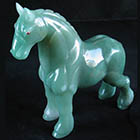Here are some images of my favorite hardstone, Faberge-like animals from my collections with stories about how they were created and why

Chapter XVII
A wine cellar interlude
Winter had come in on November 10th/23rd. A beautiful shroud of unspotted snow covered the whole of Tsarskoe. Not having enough naphtha for the central heating of the house we had closed the big salons and had clustered together in the right wing of the palace. The gallery above the heating apparatus had become our favourite corner. We had converted it into a sitting-room. It was here we took our meals and read and that Vladimir worked.
Towards the end of November the Bolshevists, having at their head the President of the Soviet of Tsarskoe-Selo, Comrade Tatarintzoff, came to make a perquisition. They were in search of stocks of flour which we were reported to have concealed. They pried about everywhere, and thus had a good opportunity of seeing where things were kept. On coming into my boudoir one of them, a Red Guard, noticed a tortoiseshell cigarette-case with gold strips incrusted in it and he slipped it surreptitiously into his pocket.
"Comrades," I exclaimed, you came to look for flour and you carry off cigarette-cases. What does that mean? "
"That means, Comrade, that I have escaped from a prison, and that it is a real joy to me to steal something from a bourgeoise like you."
"Joy or no," I replied, "if you don't put back the stolen object I shall telephone to Smolny and we shall see who has the better of it."
He threw the cigarette-case down on the table angrily; then, having found nothing, they all withdrew with many excuses.
Apart from this incident nothing had happened to trouble our existence since our return from Petrograd on November 13th/26th. My birthday in December passed quite pleasantly. Vladimir composed in my honour a charming piece of poetry which, alas! I lost in my hurried flight fourteen months later. There were some little annoyances, inevitable with such a regime. For instance, they took from us 10,000 roubles worth of kitchen utensils for the needs of the local Soviet. But these little details left us indifferent,
On the evening of December 8th/21st, we had another visit from Comrade Gueorguenberguer. He came, all amiability, explaining that the Soviet, having decided to destroy our stock of wine, he had come to give us warning so that we might put away the best bottles in safety. He seemed to me sincere; we confided to him that to our own knowledge the cellar contained 6,000 bottles - it turned out to contain 10,000.
He said to me: "Very well, then sacrifice 2 ,000 or 2 ,500 of the less precious ,"vines and hide the others. I shall be coming orders in three days' time."
He went, and in our naIve honesty we did not realise that the rascal wanted to be paid for his protection, either in wine or in money-and perhaps in both. During the next three nights we all, except the Grand Duke-that is, I myself, the children, Miss White, Jacqueline and (recently come from Petrograd) my eldest son, and Marianne and her husband Nicholas-busied ourselves transporting thousands of bottles from the cellar into all corners of the house. Five thousand of them were left in the basement not far from the cellar in immense cases. In the cellar we left only red and white wine. On the day fixed, the :I2th December, at ten o'clock in the evening, Gueorguenberguer arrived with fifteen soldiers. A complete transformation! With haughty air, his cap thrown to the back of his head, a cigarette in his mouth and his two fists on his hips.
"What's the meaning of this cellar being half empty? " he called out. "It has always been like that," I replied, still thinking he was acting a part in order to deceive the soldiers. "I told you that it contained about 2,500 bottles. You can count them."
The soldiers set to work at their task of smashing the bottles and pouring out their contents in the garden and in the gutter. At the end of five minutes hundreds of the inhabitants of Tsarskoe were there with pails and buckets, which they filled with the dreadful mixture of wine and mud and snow and bits of glass. An acrid smell spread throughout the entire house. I looked on impassively, my arms folded, at this first act in the destruction of our property. This cellar had been estimated to be worth ten millons of francs. It included the old and splendid cellar of the deceased Grand Duke Alexis, as well as that of my husband begun in 1880. I was consoling myself with the thought that the best part of it was in safety. While thus reflecting, I observed one soldier coming out of the cellar with a huge open wound, which was bleeding. He had cut himself with the glass.
"Come," I said, " I will bind you up."
I sent for the things needed, washed the wound, and made a tight bandage round it. Looking round him and seeing that we were alone in the ante-room up to which I had taken him, this revolutionary soldier bent down and kissed my hand. It was a short, silent scene. Some moments afterwards he went back to the cellar and resumed his work of destruction. Towards the end Gueorguenberguer turned to me:
"You have some more wine," he said to me. "It isn't possible that you have no finer wine."
"We had some," I said, "but we sent it into the country, to Finland, a month ago."
I lied, always imagining that I was merely answering to his cue and astonished to find him such an accomplished actor. At last, towards one in the morning, my tyrants went off, driving roughly the country folk, many of whom were lying in the snow, completely intoxicated through having drunk the wine which had been spilt all around them.
Four days later, at eleven o'clock in the evening, my footman, nicknamed "le Barbu" by my children on account of his long whiskers, rushed in, all out of breath:
"Madame la Princesse," he cried, .. the palace is again surrounded by soldiers. All the doors have guards outside them. Telephone to Comrade Gueorguenberguer to ask him to come at once! "
The telephone, as at the time of our arrest under Kerensky, was not working. Some instants later Gueorguenberguer appeared however, without any call from me, and looking pale and angry.
"Comrade, what is the meaning of this?" I asked.
"This means, Comrade, that you have lied. You have hidden wine in your house, and we are going to look for it. We shall begin upstairs."
I went to tell the Grand Duke of this new trouble. He made a weary gesture.
"Oh, let them do what they want, darling. You will only torment yourself over these bandits! " he said.
"No, no," I replied. "I'm not going to let them go all over the house by themselves. They are thieves. They would carry off everything they could put their hands on." So answering, I went back.
"Very well, then, let's begin'!" I said to the men, knowing that in the upper part of the house the wine would prove undiscoverable. But I trembled for the first floor, where in several guest-rooms the ground was simple covered with bottles. By some extraordinary chance they paid no attention to this floor and devoted their attention to the entresol-that is, the reception-rooms. They turned on all the lights and went first into the dining-room. Some pieces of silver plate glittered in glass cases, and our seventeenth and eighteenth century glass shone forth in all their splendour. Gueorguenberguer turned towards the soldiers: "See, comrades, in what luxury these aristocrats live, these members of the ex-Imperial family. While we have to live in our dungeon-like holes, in damp and unhealthy basement. . . .
I did not let him finish.
"Comrade," I said," what you are doing is very wrong. 'Why are you stirring up these thoughtless men against us, who have done you no harm? This house contains objects which my husband received from his parents. Some of them he bought himself. He never took anything from anyone else, and you are inciting them to envy and robbery! "
A soldier broke into the conversation and said to me, in rough tones: "You have drunk our blood."
"I drink your blood!" I replied. "Why, I should get ill at once if I drank anything so horrid! "
The search continued. Vladimir, having' come back from town, now joined me. The soldiers, with Gueorguenberguer at their head, went through the ball-room, then the salon d'honneur. Their muddy boots sank into the beautiful cream-coloured carpet adorned with garlands of roses. They found nothing in the great crimson salon, with its old pieces of wood-carving. They stood still, inquiringly, in front of the cabinet of Chinese jade curios, asking what they were. I had to act as guide! They did not go again into my boudoir, remarking that "a lady could not have bottles in her room," and, when passing by the rotunda, they made their way into the Grand Duke's study. My husband was seated in his arm-chair of green leather, in his usual place, reading. He had the force of character to go on reading without raising his eyes from his paper. And yet fifteen armed men were there, going this way and that, opening his book-cases, lifting up books, talking, laughing!
At last they went down into the cellar, which had been empty and open since the other evening, and they began to ransack the basement. They were not long about finding the ten enormous cases which, like ten gigantic coffins, contained 5,000 bottles. A tremendous smashing began, and there were also thefts, for at every moment soldiers went out and passed along full bottles to those who were guarding the exits from the palace. I pointed out to them that they would do better to, distribute the bottles among the hospitals and thus help those who were ill. They replied they didn't care a curse about that. It was dreadful to see those beautiful eaux-de-vie from the Bignon cellar, all the fine Madeira port, sherry, Bordeaux, Burgundy, poured out on the ground. The smell in itself was enough to intoxicate one. I remained there, trembling with the cold and rage and disgust until four in the morning, when the last bottle was smashed. Broken and dead with fatigue I went upstairs and sank down, dressed as I was, on my bed.





